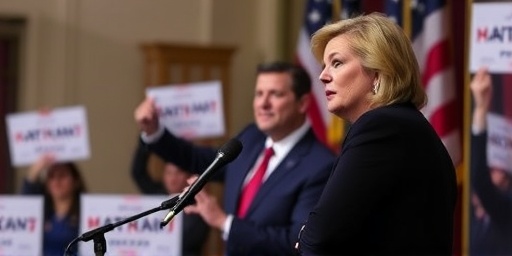In a stunning turn that has ignited fury within their own ranks, Senate Democrats, led by Majority Leader Chuck Schumer, have agreed to end the nation’s longest Government shutdown in over a decade without delivering on critical healthcare subsidies. The 43-day impasse, which began in mid-October and disrupted federal services for millions, concluded late Friday with a bipartisan funding bill that averted immediate disaster but left progressives seething over what they call a capitulation to Republican demands.
The deal, passed by Congress in a frantic late-night vote, restores funding through December 20 but postpones debates on healthcare expansions and border security measures that were central to the standoff. This outcome has exposed deep fissures in the Democratic Party, with vocal critics accusing leadership of weakness just as midterm elections loom. As federal employees return to work and families grapple with the economic fallout, questions swirl about whether this fragile truce will hold or precipitate another crisis in January.
Progressives Unleash Criticism on Schumer’s Shutdown Tactics
The backlash against Chuck Schumer and his Democratic colleagues erupted almost immediately after the bill’s passage. Progressive lawmakers and activists, who had rallied behind demands for enhanced Affordable Care Act (ACA) subsidies, decried the resolution as a betrayal of core party values. “This isn’t leadership; it’s surrender,” thundered Representative Alexandria Ocasio-Cortez (D-NY) in a fiery social media post that garnered over 500,000 views within hours. She argued that the shutdown, initially framed as a stand against Republican obstructionism, ultimately yielded nothing for vulnerable Americans relying on healthcare access.
Senate progressives like Bernie Sanders (I-VT), who caucuses with Democrats, echoed this sentiment during a press conference on Capitol Hill. “We went to the mat for working families, only to walk away empty-handed on healthcare,” Sanders said, his voice laced with frustration. “Chuck Schumer’s decision to fold has emboldened the extremists on the other side.” This internal dissent highlights a growing rift, with data from a recent Pew Research Center poll showing that 68% of Democratic voters prioritize healthcare affordability as a top issue heading into the 2024 cycle.
The criticism isn’t limited to rhetoric. Organizations like the Progressive Change Campaign Committee have launched ad campaigns targeting moderate Democrats in swing districts, labeling the shutdown’s end as “a win for Wall Street, not Main Street.” These efforts underscore the political peril for party leaders, as intraparty squabbles could erode voter enthusiasm and fundraising momentum. Schumer, in a defensive statement released Saturday, defended the move: “We secured funding for essential services and protected Social Security payments— that’s a victory for the American people.” Yet, his words have done little to quell the storm from the left flank.
Healthcare Subsidies Sidelined in Last-Minute Bipartisan Compromise
At the heart of the Democrats’ grievances lies the failure to extend enhanced healthcare subsidies under the ACA, which are set to expire at year’s end. These subsidies, introduced during the COVID-19 pandemic, have reduced premiums for millions of low- and middle-income Americans, with the Kaiser Family Foundation reporting that over 13 million people benefited in 2023 alone. Without renewal, experts warn of premium hikes averaging 50% or more, potentially leaving 4 million uninsured by mid-2024.
The Government shutdown, triggered by disputes over a $1.2 trillion spending package, saw healthcare become a flashpoint. Democrats pushed for a clean funding bill that included subsidy extensions, but Republicans, bolstered by hardliners demanding stricter border policies, refused to budge. The final agreement, hammered out in marathon negotiations involving House Speaker Mike Johnson and Schumer, omitted any healthcare provisions, opting instead for a short-term fix to reopen agencies like the FBI, TSA, and national parks.
Contextualizing this omission, the shutdown’s economic toll was staggering: The U.S. Travel Association estimated $6 billion in lost tourism revenue, while federal workers faced $11 billion in deferred wages. “Punting on healthcare subsidies isn’t just policy failure; it’s a humanitarian one,” said Dr. Elena Ramirez, a policy analyst at the Center for American Progress. In interviews with affected constituents, stories abound of families delaying treatments or rationing medications due to uncertainty. For instance, in swing states like Pennsylvania and Michigan, where healthcare access sways elections, this lapse could prove costly for Democrats.
Congressional records reveal that initial Democratic proposals sought $100 billion for subsidy enhancements, but partisan gridlock—exacerbated by the shutdown—derailed progress. As one anonymous Senate aide confided to reporters, “We knew the clock was ticking, but leadership prioritized avoiding blame over bold action.” This compromise, while ending the immediate crisis, has deferred the healthcare battle to a lame-duck session, where Republican leverage may only grow.
Exposed Rifts Threaten Democratic Unity Ahead of Midterms
The end of the Government shutdown has laid bare longstanding tensions within the Democratic Party, pitting establishment figures against a resurgent progressive wing. Chuck Schumer, often praised for his deal-making prowess, now faces accusations of prioritizing short-term stability over long-term vision. A internal memo leaked to Politico described the caucus as “fractured,” with 15 senators reportedly signing a letter urging stronger advocacy for healthcare reforms.
This intraparty drama unfolds against a backdrop of broader challenges. Gallup polls indicate Democratic approval ratings at 38%, down from 45% pre-shutdown, with independents particularly alienated by the chaos. Key figures like Senators Elizabeth Warren (D-MA) and Cory Booker (D-NJ) have publicly distanced themselves from the deal, with Warren stating in a CNN interview, “We can’t keep compromising our principles every time the pressure mounts.” Such divisions risk diluting the party’s messaging on issues like healthcare, which 72% of voters in a recent Quinnipiac survey say should be a priority for Congress.
Historically, similar rifts have plagued Democrats—recall the 2013 shutdown, when intraparty blame games contributed to midterm losses. Today, with control of the Senate hanging in the balance, the stakes are higher. Advocacy groups, including MoveOn and the Service Employees International Union, have mobilized grassroots campaigns, organizing virtual town halls that drew 20,000 participants over the weekend. “The base is fired up, but not in a good way,” noted SEIU president Mary Kay Henry. “If leadership doesn’t course-correct, turnout could suffer.”
Moreover, the shutdown’s resolution amplifies calls for structural reforms within Congress. Proposals for automatic continuing resolutions or biennial budgeting have gained traction, with bipartisan support from figures like Sen. Susan Collins (R-ME). Yet, for Democrats, the immediate focus remains mending fences to present a united front against Republican attacks portraying them as ineffective.
January Funding Cliff Looms as New Shutdown Fears Grip Washington
As the ink dries on the temporary funding measure, all eyes turn to January 15, when the latest Continuing Resolution expires, potentially ushering in another government shutdown. Analysts warn that unresolved issues—healthcare subsidies, immigration reform, and defense spending—could reignite the partisan warfare that paralyzed Washington for 43 grueling days.
The U.S. Chamber of Commerce has already sounded the alarm, projecting another shutdown could cost the economy $18 billion and exacerbate inflation pressures. Federal agencies, still reeling from the furloughs that idled 800,000 workers, are bracing for uncertainty. TSA screeners and air traffic controllers, who worked without pay during the ordeal, expressed exhaustion in union statements: “We’re patriots, but this yo-yo budgeting is unsustainable,” said National Treasury Employees Union president Doreen Greenwald.
Looking ahead, Democrats must navigate a treacherous landscape. With President Biden’s administration pushing for ACA enhancements as part of his domestic agenda, Schumer faces pressure to leverage the upcoming session. However, Republican gains in the House could stiffen opposition, especially if hardliners like Rep. Matt Gaetz demand concessions on border wall funding. Political forecasters from FiveThirtyEight predict a 40% chance of another shutdown by February, citing historical patterns.
Forward momentum may come from public advocacy. Petitions circulating online have amassed 1.2 million signatures urging Congress to prioritize healthcare, while town halls in battleground states amplify constituent voices. For the Democratic Party, the path forward involves reconciling internal divides to build a robust case for reforms. As one Capitol Hill veteran put it, “This shutdown was a wake-up call—either we unify around bold policies like healthcare expansion, or risk repeating history’s mistakes.” The coming months will test whether Democrats can transform backlash into bipartisan breakthroughs, securing the wins that eluded them this time.








